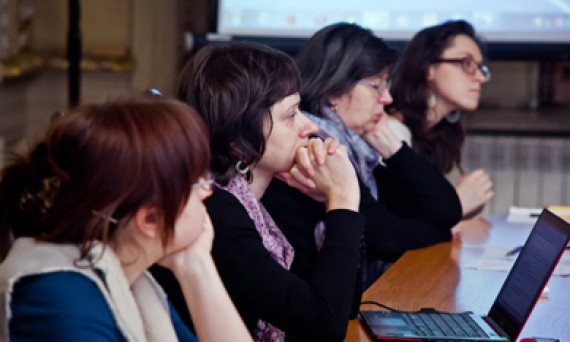The intriguingly titled program “18 +: A New Framework for Gender Citizenship” drew participants from the most diverse disciplines. The seminar took place with support from the Novartis Corporation.
The first session began with a presentation by Elena Zdravomyslova (EUSP). In her report, she showed that gender has become a central topic of political discourse in contemporary Russia, and that gender issues have provoked debate in all sectors of civil society, including the conservative part. In a report titled “What is ‘Traditional Thought’ and How Does It Influence Social Policy? On the Question of Gays, Abortion, and Feminism” Marianna Murav’eva (Oxford Brooks University) raised the question of whether authorities voice neoconservative ideology, or if it is more correct to use the term “neo-traditionalism.” The session was concluded with Tatyana Baranova’s (Higher School of Economoics, SPB) report “The Gender Repertoire of Protest Activism: Old Games about New Power?”
The second session of the seminar was devoted to issues of Russia’s LGBTQ society. Alexandra Kondakova’s (EUSP, CISR) report was an analysis of sexualized citizenship. Having identified three levels of analysis, Kondakova considered the interaction of legislatively constructed rules and institutions such as the market and state bureaucracy. Applying the conceptual notion of the “gender contract” to contemporary Russia, Olga Burmakova (EUSP) showed that an important consequence of the legislation banning LGBTQ ‘propaganda’ as well as the adoption of children by homosexual partners was to introduce homosexuality into official discourse. In her report titled “Hyper/In-Visible: The Consequences of Political Heterosexism for LGBT People in Russia Today,” Veronika Lapina (EUSP) proposed a rejection the characterizing the law banning homosexual ‘propaganda’ as homophobic. More precisely, from her point of view, is a definition of the law as a political measure in line with a policy of heterosexism and defending heterosexuality as the only norm of sexual being.
Anna Temkina (EUSP) began the next session with a report on her analysis of the critics of the bill titled “Gender and Gender Equality in Conservative Discourse: The Entaglement of the Sexes.” Having researched discussion materials and challenges to the provisions of the law in 2012 and 2013, Temkina found that in conservative discourse the law was ascribed meaning that it did not contain, and gender and gender equality were radicalized, primitivized, and regarded as the freedom to choose one’s sex. Valerij Sozaev spoke about the results of his analysis of documents from the World Russian People’s Council. Sozaev’s study suggests that ‘traditional values’ are thought of by Russian Orthodox Church hierarchs in the context of civilizational paradigms. Within this framework, the Church has been active in expanding political discourse and practice. The session was concluded by Marina Sereda’s (European Humanities University) report titled “Women in the Political Kitchen: The Antifeminist Feminism of Russian Muslims.”
The final session was devoted to policies regarding children and childhood in contemporary Russia. Darya Serebryakova (EUSP) looked at civil mobilization tied to the adoption of the Dima Yakovlev Law through a framework analysis. She identified three primary frames: the authoritative, as a reaction to the Magnitsky Law; the “diagnostic,” generated by opposition leaders and laying the blame for children’s troubles on government officials; and the civil frame, in which the main aggressor is the state and governmental institutions. Anna Fomina (EUSP) gave a report titled “Securitization: The Discourse on Child Safety and Parental Practice.” She showed the ways in which government representatives securitize threats against children, using the category of traditional attitudes toward gender. An important conclusion drawn in her report was the discrepancy between political securitization and the everyday securitization of threat to parents who do not in actuality pay much attention to non-normative gender order, and mobilizing their attention and resources to ensure the physical safety of children.
In the general discussion that concluded the seminar, participants discussed whether these phenomena reflect a conservative turn or whether it is necessary to use other terminology to understand them. The panelists were offered alternatives such as “neo-traditionalism,” “etacratic heteronormative order,” “heterosexism,” and even “gender nationalism.”
Anna Fomina















